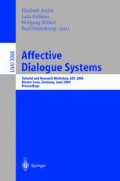Abstract
We describe the emotion and dialogue aspects of the virtual agents used in the MRE project at USC. The models of emotion and dialogue started independently, though each makes crucial use of a central task model. In this paper we describe the task model, dialogue model, and emotion model, and the interactions between them.
Access this chapter
Tax calculation will be finalised at checkout
Purchases are for personal use only
Preview
Unable to display preview. Download preview PDF.
References
Allen, J.F.: Recognizing intentions from natural language utterances. In: Brady, M., Berwick, R.C. (eds.) Computational Models of Discourse, MIT Press, Cambridge (1983)
Allwood, J., Nivre, J., Ahlsen, E.: On the semantics and pragmatics of linguistic feedback. Journal of Semantics 9 (1992)
Baker, M.: A model for negotiation in teaching-learning dialogues. Journal of Artificial Intelligence in Education 5(2), 199–254 (1994)
Clark, H.H.: Using Language. Cambridge University Press, Cambridge (1996)
Cohen, P.R., Levesque, H.J.: Rational interaction as the basis for communication. In: Cohen, P.R., Morgan, J., Pollack, M.E. (eds.) Intentions in Communication, MIT Press, Cambridge (1990)
Cohen, P.R., Perrault, C.R.: Elements of a plan-based theory of speech acts. Cognitive Science 3(3), 177–212 (1979)
Dillenbourg, P., Traum, D., Schneider, D.: Grounding in multi-modal task-oriented collaboration. In: Proceedings of the European Conference on AI in Education (1996)
Discourse Resource Initiative, Standards for dialogue coding in natural language processing. Report no. 167, Dagstuhl-Seminar (1997)
FIPA (1997), Fipa 97 specification part 2: Agent communication language. working paper, available at http://drogo.cselt.stet.it/fipa/spec/fipa97/f8a21.zip
Fleischman, M., Hovy, E.: Emotional variation in speech-based natural language generation. In: Proceedings of The Second International Natural Language Generation Conference, INLG 2002 (2002)
Gratch, J., Marsella, S.: Tears and fears: Modeling emotions and emotional behaviors in synthetic agents. In: Proceedings of the Fifth International Conference on Autonomous Agents (2001)
Gratch, J., Marsella, S.: A domain-independent framework for modeling emotion. Journal of Cognitive Systems Research (2004) (to appear)
Larsson, S., Traum, D.: Information state and dialogue management in the TRINDI dialogue move engine toolkit. Natural Language Engineering 6, 323–340 (2000); Special Issue on Spoken Language Dialogue System Engineering
Lazarus, R.: Emotion and Adaptation. Oxford Press, Oxford (1991)
Marsella, S., Gratch, J.: A step towards irrationality: using emotion to change belief. In: Proceedings of AAMAS 2002: First International Joint Conference on Autonomous Agents and Multi-Agent Systems (2002)
Marsella, S., Gratch, J.: Modeling coping behavior in virtual humans: Don’t worry, be happy. In: Proceedings of AAMAS 2003: Second International Joint Conference on Autonomous Agents and Multi-Agent Systems (2003)
Matheson, C., Poesio, M., Traum, D.: Modelling grounding and discourse obligations using update rules. In: Proceedings of the First Conference of the North American Chapter of the Association for Computational Linguistics (2000)
McAllester, D., Rosenblitt, D.: Systematic nonlinear planning. In: Proceedings of the Ninth National Conference on Artificial Intelligence (AAAI 1991), pp. 634–639. AAAI Press, Menlo Park (1991)
Muller, T.J., Hartholt, A., Marsella, S., Gratch, J., Traum, D.: Do you want to talk about it? a first step towards emotion integrated dialogue (2004) (unpublished manuscript)
Novick, D.: Control of Mixed-Initiative Discourse Through Meta- Locutionary Acts: A Computational Model. PhD thesis, University of Oregon. also available as U. Oregon Computer and Information Science Tech Report CISTR- 88-18 (1988)
Ortony, A., Clore, G., Collins, A.: The Cognitive Structure of Emotions. Cambridge University Press, Cambridge (1988)
Rickel, J., Johnson, W.L.: Animated agents for procedural training in virtual reality: Perception, cognition, and motor control. Applied Artificial Intelligence 13, 343–382 (1999)
Rickel, J., Johnson, W.L.: Extending virtual humans to support team training in virtual reality. In: Lakemayer, G., Nebel, B. (eds.) Exploring Artificial Intelligence in the New Millenium, pp. 217–238. Morgan Kaufmann, San Francisco (2002)
Rickel, J., Marsella, S., Gratch, J., Hill, R., Traum, D., Swartout, W.: Toward a new generation of virtual humans for interactive experiences. IEEE Intelligent Systems 17 (2002)
Sidner, C.L.: An artificial discourse language for collaborative negotiation. In: Proceedings of the Fourteenth National Conference of the American Association for Artificial Intelligence (AAAI 1994), pp. 814–819 (1994)
Traum, D.: Semantics and pragmatics of questions and answers for dialogue agents. In: Proceedings of the International Workshop on Computational Semantics, pp. 380–394 (2003)
Traum, D., Fleischman, M., Hovy, E.: Nl generation for virtual humans in a complex social environment. In: Working Notes AAAI Spring Symposium on Natural Language Generation in Spoken and Written Dialogue (2003a)
Traum, D., Rickel, J., Marsella, S., Gratch, J.: Negotiation over tasks in hybrid human-agent teams for simulation-based training. In: Proceedings of AAMAS 2003: Second International Joint Conference on Autonomous Agents and Multi-Agent Systems, pp. 441–448 (2003b)
Traum, D.R.: A Computational Theory of Grounding in Natural Language Conversation. PhD thesis, Department of Computer Science, University of Rochester. Also available as TR 545, Department of Computer Science, University of Rochester (1994)
Traum, D.R., Allen, J.F.: Discourse obligations in dialogue processing. In: Proceedings of the 32nd Annual Meeting of the Association for Computational Linguistics, pp. 1–8 (1994)
Traum, D.R., Hinkelman, E.A.: Conversation acts in task-oriented spoken dialogue. Computational Intelligence 8(3), 575–599 (1992); Special Issue on Nonliteral language
Traum, D.R., Rickel, J.: Embodied agents for multi-party dialogue in immersive virtual worlds. In: Proceedings of the first International Joint conference on Autonomous Agents and Multiagent systems, pp. 766–773 (2002)
Walker, M.A., Whittaker, S.: Mixed initiative in dialogue: An investigation into discourse segmentation. In: Proceedings ACL 1990, pp. 70–78 (1990)
Author information
Authors and Affiliations
Editor information
Editors and Affiliations
Rights and permissions
Copyright information
© 2004 Springer-Verlag Berlin Heidelberg
About this paper
Cite this paper
Traum, D., Marsella, S., Gratch, J. (2004). Emotion and Dialogue in the MRE Virtual Humans. In: André, E., Dybkjær, L., Minker, W., Heisterkamp, P. (eds) Affective Dialogue Systems. ADS 2004. Lecture Notes in Computer Science(), vol 3068. Springer, Berlin, Heidelberg. https://doi.org/10.1007/978-3-540-24842-2_12
Download citation
DOI: https://doi.org/10.1007/978-3-540-24842-2_12
Publisher Name: Springer, Berlin, Heidelberg
Print ISBN: 978-3-540-22143-2
Online ISBN: 978-3-540-24842-2
eBook Packages: Springer Book Archive

